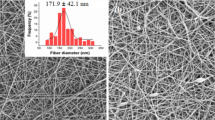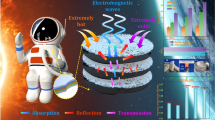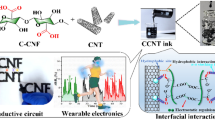Abstract
Heat regulation and water resistance patterns are of great interest to the membrane industry. Herein, blends of environmentally friendly composites of poly(butylene adipate-co-terephthalate) (PBAT) modified with acrylic acid (MPBAT) and a mixed complex of silica aerogel powder (SAP) and seashell (oyster shell) [hereafter referred to as TSAP] nanocomposites were fabricated using an electrospinning process to create 100–500-nm antimicrobial fibers. The structure and functionality of the nanofiber mats were characterized. The PBAT mats showed high water absorption (lower water contact angle), poor thermal conductivity, and no antimicrobial activity. Compared with PBAT and PBAT/SAP mats, MPBAT/TSAP mats showed lower water absorption (higher water contact angle), better thermal conductivity, and good antimicrobial activity. Recycled polyethylene terephthalate fabrics coated with PBAT/SAP and MPBAT/TSAP mats were prepared; the fabrics exhibited good heat regulation. MPBAT/TSAP nanofiber mats showed good tensile strength and heat insulation capability, as well as water resistance and antimicrobial properties. The developed MPBAT/TSAP nanofibers can be mass-produced and are suitable for membrane products requiring variable degrees of heat regulation and antimicrobial protection.









Similar content being viewed by others
References
Velis CA, Cook E (2021) Mismanagement of plastic waste through open burning with emphasis on the global south: a systematic review of risks to occupational and public health. Environ Sci Technol 55(11):7186–7207. https://doi.org/10.1021/acs.est.0c08536
Nimmegeers P, Billen P (2021) Quantifying the separation complexity of mixed plastic waste streams with statistical entropy: a plastic packaging waste case study in belgium. ACS Sustain Chem Eng 9(29):9813–9822. https://doi.org/10.1021/acssuschemeng.1c02404
Lange JP (2021) Managing plastic waste─sorting, recycling, disposal, and product redesign. ACS Sustain Chem Eng 9(47):15722–15738. https://doi.org/10.1021/acssuschemeng.1c05013
Ghosh K, Jones BH (2021) Roadmap to biodegradable plastics—current state and research needs. ACS Sustain Chem Eng 9(18):6170–6187. https://doi.org/10.1021/acssuschemeng.1c00801
Flury M, Narayan R (2021) Biodegradable plastic as an integral part of the solution to plastic waste pollution of the environment. Curr Opin Green Sustain Chem 30:100490. https://doi.org/10.1016/j.cogsc.2021.100490
Moshood TD, Nawanir G, Mahmud F, Mohamad F, Ahmad MH, AbdulGhani A (2022) Biodegradable plastic applications towards sustainability: a recent innovations in the green product. Chem Eng Technol 6:100404. https://doi.org/10.1016/j.clet.2022.100404
Xiong SJ, Pang B, Zhou SJ, Li MK, Yang S, Wang YY, Shi Q, Wang SF, Yuan TQ, Sun RC (2020) Economically competitive biodegradable PBAT/Lignin composites: effect of lignin methylation and compatibilizer. ACS Sustain Chem Eng 8:5338–5346. https://doi.org/10.1021/acssuschemeng.0c00789
Ye S, Xiang X, Wang S, Han D, Xiao M, Meng Y (2020) Nonisocyanate CO2-based poly(ester-co-urethane)s with tunable performances: a potential alternative to improve the biodegradability of PBAT. ACS Sustain Chem Eng 8:1923–1932. https://doi.org/10.1021/acssuschemeng.9b06294
Jian J, Xiangbin Z, Xianbo H (2020) An overview on synthesis, properties and applications of poly(butylene-adipate-co-terephthalate)–PBAT. Adv Ind Eng Polym Res 3(1):19–26. https://doi.org/10.1016/j.aiepr.2020.01.001
Ferreira FV, Cividanes LS, Gouveia RF, Lona LMF (2019) An overview on properties and applications of poly(butylene adipate-co-terephthalate)–PBAT based composites. Polym Eng Sci 59(s2):E7–E15. https://doi.org/10.1002/pen.24770
Han Y, Shi J, Mao L, Wang Z, Zhang L (2020) Improvement of compatibility and mechanical performances of PLA/PBAT composites with epoxidized soybean oil as compatibilizer. Ind Eng Chem Res 59:21779–21790. https://doi.org/10.1021/acs.iecr.0c04285
Nakayama D, Wu F, Mohanty AK, Misra HS, M, (2018) Biodegradable composites developed from PBAT/PLA binary blends and silk powder: compatibilization and performance evaluation. ACS Omega 3:12412–12421. https://doi.org/10.1021/acsomega.8b00823
Noroozi M, Panahi-Sarmad M, Abrisham M, Amirkiai A, Asghari N, Golbaten-Mofrad H, Karimpour-Motlagh N, Goodarzi V, Bahramian AZ, Zahiri B (2019) Nanostructure of aerogels and their applications in thermal energy insulation. ACS Appl Energy Mater 2(8):5319–5349. https://doi.org/10.1021/acsaem.9b01157
Asim N, Badiei M, Alghoul MA, Mohammad M, Fudholi A, Akhtaruzzaman M, Amin N, Sopian K (2019) Biomass and industrial wastes as resource materials for aerogel preparation: Opportunities, challenges, and research directions. Ind Eng Chem Res 58(38):17621–17645. https://doi.org/10.1021/acs.iecr.9b02661
Chen Z, Zhao Y, Zhu X (2021) Inclusion of hydrophobic liquids in silica aerogel microparticles in an aqueous process: microencapsulation and extra pore creation. ACS Appl Mater Interfaces 13:12230–12240. https://doi.org/10.1021/acsami.1c00205
Salimian S, Zadhoush A, Talebi Z, Fischer B, Winiger P, Winnefeld F, Zhao S, Barbezat M, Koebel MM, Malfait WJ (2018) Silica aerogel–epoxy nanocomposites: understanding epoxy reinforcement in terms of aerogel surface chemistry and epoxy–silica interface compatibility. ACS Appl Nano Mater 1:4179–4189. https://doi.org/10.1021/acsanm.8b00941
Gautam S, Liu T, Rother G, Jalarvo N, Mamontov E, Welch S, Sheets J, Droege M, Cole DR (2015) Dynamics of propane in nanoporous silica aerogel: a quasielastic neutron scattering study. J Phys Chem C 119:18188–18195. https://doi.org/10.1021/acs.jpcc.5b03444
Shams-Ghahfarokhi F, Khoddami A, Mazrouei-Sebdani Z, Rahmatinejad J, Mohammadi H (2019) A new technique to prepare a hydrophobic and thermal insulating polyester woven fabric using electro-spraying of nano-porous silica powder. Surf Coat Tech 366:97–105. https://doi.org/10.1016/j.surfcoat.2019.03.025
Karagoz S, Kiremitler NB, Sakir M, Salem S, Onses MS, Sahmetlioglu E, Ceylan A, Yilmaz E (2020) Synthesis of Ag and TiO2 modified polycaprolactone electrospun nanofibers (PCL/TiO2-Ag NFs) as a multifunctional material for SERS, photocatalysis and antibacterial applications. Ecotoxicol Environ Saf 188:109856. https://doi.org/10.1016/j.ecoenv.2019.109856
Ghiyasi Y, Salahi E, Esfahani H (2021) Synergy effect of Urtica dioica and ZnO NPs on microstructure, antibacterial activity and cytotoxicity of electrospun PCL scaffold for wound dressing application. Mater Today Commun 26:102163. https://doi.org/10.1016/j.mtcomm.2021.102163
Hembrick-Holloman V, Samue T, Mohammed Z, Jeelani S, Rangari VK (2020) Ecofriendly production of bioactive tissue engineering scaffolds derived from egg- and sea-shells. J Mater Res Technol 9:13729–13739. http://creativecommons.org/licenses/by-nc-nd/4.0/
de Assis Filho RB, Baptisttella AMS, de Araujo CMB, Fraga TJM, de Paiva TMN, de Abreu CAM, da Motta Sobrinho MA (2021) Removal of textile dyes by benefited marine shells waste: from circular economy to multi-phenomenological modeling. J Environ Manage 296:113222. https://doi.org/10.1016/j.jenvman.2021.113222
Park K, Sadeghi K, Thanakkasaranee S, Park YI, Park J, Nam KH, Han H, Seo J (2021) Effects of calcination temperature on morphological and crystallographic properties of oyster shell as a biocidal agent. Int J Appl Ceram Technol 18:302–311. https://doi.org/10.1111/ijac.13647
Dampang S, Purwanti E, Destyorini F, Kurniawan SBKB, Abdullah SRS, Imron MF (2021) Imron, analysis of optimum temperature and calcination time in the production of CaO using seashells waste as CaCO3 source. J Ecol Eng 22:221–228. https://doi.org/10.12911/22998993/135316
Seo JH, Park SM, Yang BJ, Jang JG (2019) Calcined oyster shell powder as an expansive additive in cement mortar. Materials 12:1322. https://doi.org/10.3390/ma12081322
Ng JJ, Supaphol P (2018) Rotating-disk electrospinning: needleless electrospinning of poly(caprolactone), poly(lactic acid) and poly(vinyl alcohol) nanofiber mats with controlled morphology. J Polym Res 25:155. https://doi.org/10.1007/s10965-018-1540-4
Li Y, Zhang J, Xu C, Zhou Y (2016) Crosslinked chitosan nanofiber mats fabricated by one-step electrospinning and ion-imprinting methods for metal ions adsorption. Sci China Chem 59:95–105. https://doi.org/10.1007/s11426-015-5526-3
Phan DN, Khan MQ, Nguyen NT, Phan TT, Ullah A, Khatri M, Kien NN, Kim IS (2021) A review on the fabrication of several carbohydrate polymers into nanofibrous structures using electrospinning for removal of metal ions and dyes. Carbohydr Polym 252:117175. https://doi.org/10.1016/j.carbpol.2020.117175
Zhou W, Gong X, Li Y, Si Y, Zhang S, Yu J, Ding B (2022) Environmentally friendly waterborne polyurethane nanofibrous membranes by emulsion electrospinning for waterproof and breathable textiles. Chem Eng J 427:130925. https://doi.org/10.1016/j.cej.2021.130925
Anstey A, Chang E, Kim ES, Rizvi A, Kakroodi AR, Park CB, Lee PC (2021) Nanofibrillated polymer systems: design, application, and current state of the art. Prog Polym Sci 113:101346. https://doi.org/10.1016/j.progpolymsci.2020.101346
Thenmozhi S, Dharmaraj N, Kadirvelu K, Kim HY (2017) Electrospun nanofibers: new generation materials for advanced applications. Mater Sci Eng B 217:36–48. https://doi.org/10.1016/j.mseb.2017.01.001
Rodríguez-Tobías H, Morales G, Grande D (2019) Comprehensive review on electrospinning techniques as versatile approaches toward antimicrobial biopolymeric composite fibers. Mater Sci Eng C 101:306–322. https://doi.org/10.1016/j.msec.2019.03.099
Vahabi H, Wu H, Saeb MR, Koo JH (2021) Ramakrishna S. Electrospinning for developing flame retardant polymer materials: current status and future perspectives. Polymer 217:123466. https://doi.org/10.1016/j.polymer.2021.123466
Wu CS (2011) Process, characterization and biodegradability of aliphatic aromatic polyester/sisal fiber. J Polym Environ 19:706–713. https://doi.org/10.1007/s10924-011-0318-0
Wu CS (2012) Process, Utilization of peanut husks as a filler in aliphatic–aromatic polyesters: preparation, characterization, and biodegradability. Polym Degrad Stab 97:2388–2395. https://doi.org/10.1016/j.polymdegradstab.2012.07.027
Wu DY, Wang SS, Wu CS (2021) Textile fabrics containing recycled poly(ethylene terephthalate), oyster shells, and silica aerogels with superior heat insulation, water resistance, and antibacterial properties. ACS Appl Polym Mater 3:3175–3184. https://doi.org/10.1021/acsapm.1c00365
Wu CS, Wu DY, Wang SS, Chan LP, Liang CH (2020) Modulation of polylactic acid nanofiber containing corn stalk waste via electrospinning: fabrication, characterization, and cytocompatibility. Int J Polym Mater Po 70:1236–1247. https://doi.org/10.1080/00914037.2020.1785461
Wu CS, Wu DY, Wang SS (2021) Preparation, characterization, and performance of bio-based polyester composites derived from renewable distillers grains and shellfish. J Polym Res 28:114. https://doi.org/10.1007/s10965-021-02471-8
Wu CS, Wang SS, Wu DY, Shih WL (2021) Novel composite 3D-printed filament made from fish scale-derived hydroxyapatite, eggshell and polylactic acid via a fused fabrication approach. Addit Manuf 46:102169. https://doi.org/10.1016/j.addma.2021.102169
Wu CS (2012) Aliphatic–aromatic polyester–polyaniline composites: preparation, characterization, antibacterial activity and conducting properties. Polym Int 61:1556–1563. https://doi.org/10.1002/pi.4247
Zhang X, Chen Z, Zhang J, Ye X, Cui S (2021) Hydrophobic silica aerogels prepared by microwave irradiation. Chem Phy Lett 762:138127. https://doi.org/10.1016/j.cplett.2020.138127
Wu CS, Liao HT, Tsou CH (2018) Polyester-based green renewable eco-composites by solar energy tube processing: characterization and assessment of properties. J Polym Res 25:240. https://doi.org/10.1007/s10965-018-1628-x
Wu CS, Wu DY, Wang SS (2019) Antibacterial properties of biobased polyester composites achieved through modification with a thermally treated waste scallop shell. ACS Appl Bio Mater 2:2262–2270. https://doi.org/10.1021/acsabm.9b00205
Liu Y, Liu S, Liu Z, Lei Y, Jiang S, Zhang K, Yan W, Qin J, He M, Qin S, Yu J (2021) Enhanced mechanical and biodegradable properties of PBAT/lignin composites via silane grafting and reactive extrusion. Compos B Eng 220:108980. https://doi.org/10.1016/j.compositesb.2021.108980
Jabbari-Gargari A, Moghaddas J, Hamishehkar H, Jafarizadeh-Malmiri H (2021) Carboxylic acid decorated silica aerogel nanostructure as drug delivery carrier. Microporous Mesoporous Mater 323:111220. https://doi.org/10.1016/j.micromeso.2021.111220
Wu CS, Liao HT (2017) Interface design and reinforced features of arrowroot (Maranta arundinacea) starch/polyester-based membranes: preparation, antioxidant activity, and cytocompatibility. Mater Sci Eng C 70:54–61. https://doi.org/10.1016/j.msec.2016.08.067
Janković B, Smičiklas I, Manić N, Mraković A, Mandić M, Veljović Đ, Jović M (2020) Thermo-oxidative evolution and physico-chemical characterization of seashell waste for application in commercial sectors. Thermochim Acta 686:178568. https://doi.org/10.1016/j.tca.2020.178568
Renjith PK, Sarathchandran C, Sivanandan Achary V, Chandramohanakumar N, Sekkar V (2021) Micro-cellular polymer foam supported silica aerogel: eco-friendly tool for petroleum oil spill cleanup. J Hazard Mater 415:125548. https://doi.org/10.1016/j.jhazmat.2021.125548
Lule ZC, Oh H, Kim J (2020) Enhanced directional thermal conductivity of polylactic acid/polybutylene adipate terephthalate ternary composite filled with oriented and surface treated boron nitride. Polym Test 86:106495. https://doi.org/10.1016/j.polymertesting.2020.106495
Lule ZC, Kim J (2021) Compatibilization effect of silanized SiC particles on polybutylene adipate terephthalate/polycarbonate blends. Mater Chem Phy 258:123879. https://doi.org/10.1016/j.matchemphys.2020.123879
Mazrouei-Sebdani Z, Begum H, Schoenwald S, Horoshenkov KV, Malfait WJ (2021) A review on silica aerogel-based materials for acoustic applications. J Non-Cryst Solids 562:120770. https://doi.org/10.1016/j.jnoncrysol
Awang N, Nasir AM, Yajid MAM, Jaafar J (2021) A review on advancement and future perspective of 3D hierarchical porous aerogels based on electrospun polymer nanofibers for electrochemical energy storage application. J Environ Chem Eng 9:105437. https://doi.org/10.1016/j.jece.2021.105437
Wu CS, Wu DY, Wang SS (2022) Heat-regulating polylactic acid/silica aerogel composite fabric: preparation and characterization. Express Polym Lett 16(1):21–33. https://doi.org/10.3144/expresspolymlett.2022.3
Kaya GG, Deveci H (2020) Synergistic effects of silica aerogels/xerogels on properties of polymer composites: a review. J Ind EngChem 89:13–27. https://doi.org/10.1016/j.jiec.2020.05.019
Lee EJ, Deka BJ, An AK (2019) Reinforced superhydrophobic membrane coated with aerogel-assisted polymeric microspheres for membrane distillation. J Membr Sci 573:570–578. https://doi.org/10.1016/j.memsci.2018.12.019
Cheng SY, Thao NTNL, Chiang KY (2020) Hydrogen gas yield and trace pollutant emission evaluation in automotive shredder residue (ASR) gasification using prepared oyster shell catalyst. Int J Hydrog Energy 45:22232–22245. https://doi.org/10.1016/j.ijhydene.2020.01.005
Tsuruma A, Nomoto Y, Nishio M, Ishikawa M, Sawai J (2020) Efficacy of sorbitol-coated heated scallop-shell powder for the antimicrobial treatment of fresh vegetables. Food Control 110:106972. https://doi.org/10.1016/j.foodcont.2019.106972
Beyler-Çigil A, Birtane H, Sen F, Kahraman MV (2021) Transparent and flexible antibacterial photocrosslinked thin films against the S. aureus and E. coli pathogen bacteria. Mater Today Commun 27:102463. https://doi.org/10.1016/j.mtcomm.2021.102463
Acknowledgements
The author thanks the Ministry of Science and Technology (Taipei City, Taiwan, R.O.C.) for financial support (MOST 110-2221-E-244 -001-).
Author information
Authors and Affiliations
Corresponding author
Ethics declarations
Conflict of interest
The authors declare no competing financial interest.
Additional information
Publisher's Note
Springer Nature remains neutral with regard to jurisdictional claims in published maps and institutional affiliations.
Supplementary Information
Below is the link to the electronic supplementary material.
Rights and permissions
About this article
Cite this article
Wu, CS., Wu, DY. & Wang, SS. Characterization and functionality of nanocomposite mats containing polyester, seashell, and silica aerogel using an electrospinning fabrication approach. Polym. Bull. 80, 1545–1563 (2023). https://doi.org/10.1007/s00289-022-04131-3
Received:
Revised:
Accepted:
Published:
Issue Date:
DOI: https://doi.org/10.1007/s00289-022-04131-3




